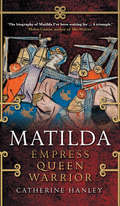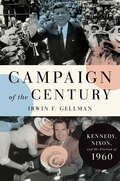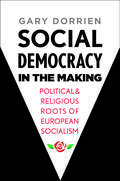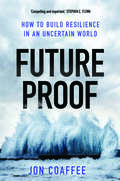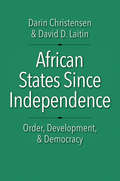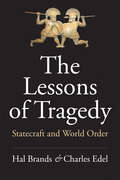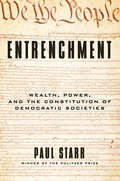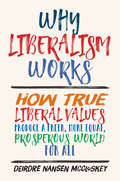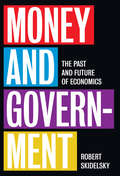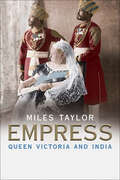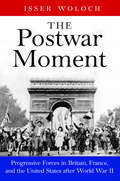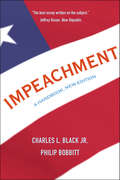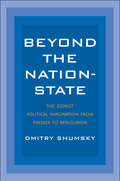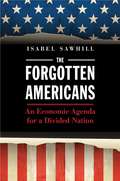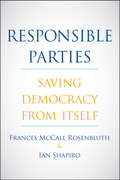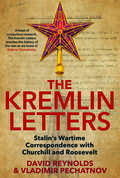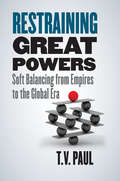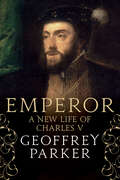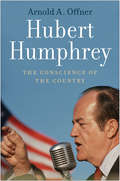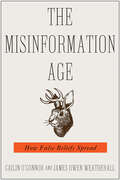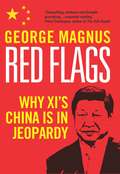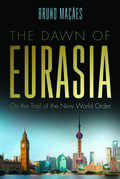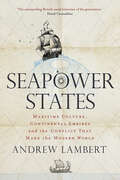- Table View
- List View
Matilda: Empress, Queen, Warrior
by Catherine HanleyA life of Matilda—empress, skilled military leader, and one of the greatest figures of the English Middle Ages Matilda was a daughter, wife, and mother. But she was also empress, heir to the English crown—the first woman ever to hold the position—and an able military general. This new biography explores Matilda’s achievements as military and political leader, and sets her life and career in full context. Catherine Hanley provides fresh insight into Matilda's campaign to claim the title of queen, her approach to allied kingdoms and rival rulers, and her role in the succession crisis. Hanley highlights how Matilda fought for the throne, and argues that although she never sat on it herself her reward was to see her son become king. Extraordinarily, her line has continued through every single monarch of England or Britain from that time to the present day.
Putin vs. the People: The Perilous Politics of a Divided Russia
by Graeme B. Robertson Samuel A. GreeneA fascinating,bottom-up exploration of contemporary Russian politics that sheds new light on why Putin’s grip on power is more fragile than we think “Putin vs. the People wrestles with perhaps the central conundrum of contemporary Russia: the endurance of support for Putin amid deepening disillusionment with the present and pessimism about the future.”—Daniel Beer, The Guardian What do ordinary Russians think of Putin? Who are his supporters? And why might their support now be faltering? Alive with the voices and experiences of ordinary Russians and elites alike, Sam Greene and Graeme Robertson craft a compellingly original account of contemporary Russian politics. Telling the story of Putin’s rule through pivotal episodes such as the aftermath of the "For Fair Elections" protests, the annexation of Crimea, and the War in Eastern Ukraine, Greene and Robertson draw on interviews, surveys, social media data, and leaked documents to reveal how hard Putin has to work to maintain broad popular support, while exposing the changing tactics that the Kremlin has used to bolster his popularity. Unearthing the ambitions, emotions, and divisions that fuel Russian politics, this book illuminates the crossroads to which Putin has led his country and shows why his rule is more fragile than it appears.
Campaign of the Century: Kennedy, Nixon, and the Election of 1960
by Irwin F. GellmanBased on massive new research, a compelling and surprising account of the twentieth century's closest election The 1960 presidential election between John F. Kennedy and Richard Nixon is one of the most frequently described political events of the twentieth century, yet the accounts to date have been remarkably unbalanced. Far more attention is given to Kennedy's side than to Nixon's. The imbalance began with the first book on that election, Theodore White&’s The Making of the President 1960—in which (as he later admitted) White deliberately cast Kennedy as the hero and Nixon as the villain—and it has been perpetuated in almost every book since then. Few historians have attempted an unbiased account of the election, and none have done the archival research that Irwin F. Gellman has done. Based on previously unused sources such as the FBI's surveillance of JFK and the papers of Leon Jaworski, vice-presidential candidate Henry Cabot Lodge, and many others, this book presents the first even-handed history of both the primary campaigns and the general election. The result is a fresh, engaging chronicle that shatters long‑held myths and reveals the strengths and weaknesses of both candidates.
Social Democracy in the Making: Political and Religious Roots of European Socialism
by Gary DorrienAn expansive and ambitious intellectual history of democratic socialism from one of the world’s leading intellectual historians and social ethicists The fallout from twenty years of neoliberal economic globalism has sparked a surge of interest in the old idea of democratic socialism—a democracy in which the people control the economy and government, no group dominates any other, and every citizen is free, equal, and included. With a focus on the intertwined legacies of Christian socialism and Social Democratic politics in Britain and Germany, this book traces the story of democratic socialism from its birth in the nineteenth century through the mid‑1960s. Examining the tenets on which the movement was founded and how it adapted to different cultural, religious, and economic contexts from its beginnings through the social and political traumas of the twentieth century, Gary Dorrien reminds us that Christian socialism paved the way for all liberation theologies that make the struggles of oppressed peoples the subject of redemption. He argues for a decentralized economic democracy and anti-imperial internationalism.
Futureproof: How to Build Resilience in an Uncertain World
by Jon CoaffeeA compelling and definitive account of why we need to radically rethink our approach to dealing with catastrophic events Catastrophic events such as 9/11, Hurricane Katrina, and the Tohoku "Triple Disaster" of earthquake, tsunami, and nuclear meltdown that hit the eastern seaboard of Japan in 2012 are seen as surprises that have a low probability of occurring but have a debilitating impact when they do. In this eye-opening journey through modern and ancient risk management practices, Jon Coaffee explains why we need to find a new way to navigate the deeply uncertain world that we live in. Examining how governments have responded to terrorist threats, climate change, and natural hazards, Coaffee shows how and why these measures have proven inadequate and what should be done to make us more resilient. While conventional approaches have focused on planning and preparing for disruptions and enhanced our ability to "bounce back," our focus should be on anticipating future challenges and enhancing our capacity to adapt to new threats.
African States since Independence: Order, Development, and Democracy (Castle Lecture Series)
by Darin Christensen David D. LaitinAuthors Christensen and Laitin argue that an interplay of geographic, historical, and demographic factors undergird sub‑Saharan states’ post‑independence struggles to eradicate poverty, establish democratic accountability, and quell civil unrest. They set out the founding fathers’ challenges in transforming their postcolonial states, many of which are ethnically diverse, geographically diffuse, sparsely populated, and lacking in administrative capacity. With the legacies of the slave trade, partition, Christian missionaries, and extractive colonial institutions complicating their efforts, many African states faced stagnation, authoritarianism, and civil strife. Recent years have seen promising attempts to restore democracy to states under authoritarian rule and to liberalize their economies, suggesting that the region is moving toward a new era. Relying on the best statistical data and richly illustrated with case material, this book is an indispensable source for scholars and policy analysts seeking to understand Africa’s post‑independence political trajectories.
The Lessons of Tragedy: Statecraft and World Order
by Hal Brands Charles EdelA “brilliant” examination of American complacency and how it puts the nation’s—and the world’s—security at risk (The Wall Street Journal).The ancient Greeks hard-wired a tragic sensibility into their culture. By looking disaster squarely in the face, by understanding just how badly things could spiral out of control, they sought to create a communal sense of responsibility and courage—to spur citizens and their leaders to take the difficult actions necessary to avert such a fate. Today, after more than seventy years of great-power peace and a quarter-century of unrivaled global leadership, Americans have lost their sense of tragedy. They have forgotten that the descent into violence and war has been all too common throughout human history. This amnesia has become most pronounced just as Americans and the global order they created are coming under graver threat than at any time in decades.In a forceful argument that brims with historical sensibility and policy insights, two distinguished historians argue that a tragic sensibility is necessary if America and its allies are to address the dangers that menace the international order today. Tragedy may be commonplace, Brands and Edel argue, but it is not inevitable—so long as we regain an appreciation of the world’s tragic nature before it is too late.“Literate and lucid—sure to interest to readers of Fukuyama, Huntington, and similar authors as well as students of modern realpolitik.” —Kirkus Reviews
Entrenchment: Wealth, Power, and the Constitution of Democratic Societies
by Paul StarrAn investigation into the foundations of democratic societies and the ongoing struggle over the power of concentrated wealthMuch of our politics today, Paul Starr writes, is a struggle over entrenchment—efforts to bring about change in ways that opponents will find difficult to undo. That is why the stakes of contemporary politics are so high. In this wide-ranging book, Starr examines how changes at the foundations of society become hard to reverse—yet sometimes are overturned. Overcoming aristocratic power was the formative problem for eighteenth-century revolutions. Overcoming slavery was the central problem for early American democracy. Controlling the power of concentrated wealth has been an ongoing struggle in the world&’s capitalist democracies. The battles continue today in the troubled democracies of our time, with the rise of both oligarchy and populist nationalism and the danger that illiberal forces will entrench themselves in power. Entrenchment raises fundamental questions about the origins of our institutions and urgent questions about the future.
Why Liberalism Works: How True Liberal Values Produce a Freer, More Equal, Prosperous World for All
by Deirdre Nansen McCloskeyAn insightful and passionately written book explaining why a return to Enlightenment ideals is good for the world The greatest challenges facing humankind, according to Deirdre McCloskey, are poverty and tyranny, both of which hold people back. Arguing for a return to true liberal values, this engaging and accessible book develops, defends, and demonstrates how embracing the ideas first espoused by eighteenth-century philosophers like Locke, Smith, Voltaire, and Wollstonecraft is good for everyone. With her trademark wit and deep understanding, McCloskey shows how the adoption of Enlightenment ideals of liberalism has propelled the freedom and prosperity that define the quality of a full life. In her view, liberalism leads to equality, but equality does not necessarily lead to liberalism. Liberalism is an optimistic philosophy that depends on the power of rhetoric rather than coercion, and on ethics, free speech, and facts in order to thrive.
Money and Government: The Past and Future of Economics
by Robert SkidelskyA critical examination of economics' past and future, and how it needs to change, by one of the most eminent political economists of our time The dominant view in economics is that money and government should play only minor roles in economic life. Economic outcomes, it is claimed, are best left to the "invisible hand" of the market. Yet these claims remain staunchly unsettled. The view taken in this important new book is that the omnipresence of uncertainty makes money and government essential features of any market economy. Since Adam Smith, classical economics has espoused non-intervention in markets. The Great Depression brought Keynesian economics to the fore; but stagflation in the 1970s brought a return to small-state orthodoxy. The 2008 global financial crash should have brought a reevaluation of that stance; instead the response has been punishing austerity and anemic recovery. This book aims to reintroduce Keynes’s central insights to a new generation of economists, and embolden them to return money and government to the starring roles in the economic drama that they deserve.
Charleston Fancy: Little Houses and Big Dreams in the Holy City
by Witold RybczynskiA captivating chronicle of building in modern-day Charleston, making a case for architecture based on historical precedent, local context, and the ability to delight Charleston, South Carolina, which boasts America’s first historic district, is known for its palmetto-lined streets and picturesque houses. The Holy City, named for its profusion of churches, exudes an irresistible charm. Award-winning author and cultural critic Witold Rybczynski unfolds a series of stories about a group of youthful architects, builders, and developers based in Charleston: a self-taught home builder, an Air Force pilot, a fledgling architect, and a bluegrass mandolin player. Beginning in the 1980s, this cast of characters, exercising a kind of amateur mastery, produced an eclectic array of buildings inspired by the past—including a domed Byzantine drawing room, a fanciful medieval castle, a restored freedman’s cottage, a miniature Palladian villa, and a contemporary Mediterranean street. In his careful profiles of these protagonists and the challenges they have overcome in realizing their dreams, Rybczynski compellingly emphasizes the importance of architecture and urban design on a local level, how an old city can remake itself by invention as well as replication, and the role that individuals still play in transforming the urban landscapes around them.
Empress: Queen Victoria and India
by Miles TaylorAn entirely original account of Victoria’s relationship with the Raj, which shows how India was central to the Victorian monarchy from as early as 1837 In this engaging and controversial book, Miles Taylor shows how both Victoria and Albert were spellbound by India, and argues that the Queen was humanely, intelligently, and passionately involved with the country throughout her reign and not just in the last decades. Taylor also reveals the way in which Victoria’s influence as empress contributed significantly to India’s modernization, both political and economic. This is, in a number of respects, a fresh account of imperial rule in India, suggesting that it was one of Victoria’s successes.
The Postwar Moment: Progressive Forces in Britain, France, and the United States after World War II
by Isser WolochAn incisive, comparative study of the development of Post–World War II progressive politics in the United States, Britain, and France After the end of World War II, Britain, France, and the United States were faced with two very different choices: return to the civic order of pre-war normalcy or embark instead on a path of progressive transformation. In this ambitious and original work, Isser Woloch assesses the progressive agendas that crystalized in each of the three allied democracies, tracing their roots in the interwar decades, their development during wartime, the struggles to establish them after the war’s end, and the mixed outcome in each country. A fellow of the Guggenheim Foundation, the National Endowment for the Humanities, and the Institute for Advanced Study at Princeton, Woloch is a highly regarded scholar who adds the United States to a discussion that is usually focused solely on Europe. His enlightening work successfully argues that the postwar moment deserves a more prominent place in the history of progressive politics.
Impeachment: A Handbook
by Philip Bobbitt Charles L. BlackCharles L. Black Jr.’s classic guide to presidential impeachment, now in an updated edition with new material by Philip Bobbitt Originally published at the height of the Watergate crisis and reissued in 1998, two months before the second impeachment of a U.S. president, Charles Black’s Impeachment became the premier guide to the subject of presidential impeachment. Now thoroughly updated, it is essential reading for every concerned citizen.
Beyond the Nation-State: The Zionist Political Imagination from Pinsker to Ben-Gurion
by Dmitry ShumskyA revisionist account of Zionist history, challenging the inevitability of a one-state solution, from a bold, path-breaking young scholar The Jewish nation-state has often been thought of as Zionism’s end goal. In this bracing history of the idea of the Jewish state in modern Zionism, from its beginnings in the late nineteenth century until the establishment of the state of Israel, Dmitry Shumsky challenges this deeply rooted assumption. In doing so, he complicates the narrative of the Zionist quest for full sovereignty, provocatively showing how and why the leaders of the pre-state Zionist movement imagined, articulated and promoted theories of self-determination in Palestine either as part of a multinational Ottoman state (1882-1917), or in the framework of multinational democracy. In particular, Shumsky focuses on the writings and policies of five key Zionist leaders from the Habsburg and Russian empires in central and eastern Europe in the late nineteenth and early twentieth centuries: Leon Pinsker, Theodor Herzl, Ahad Ha’am, Ze’ev Jabotinsky, and David Ben-Gurion to offer a very pointed critique of Zionist historiography.
The Forgotten Americans: An Economic Agenda for a Divided Nation
by Isabel SawhillA sobering account of a disenfranchised American working class and important policy solutions to the nation’s economic inequalities One of the country’s leading scholars on economics and social policy, Isabel Sawhill addresses the enormous divisions in American society—economic, cultural, and political—and what might be done to bridge them. Widening inequality and the loss of jobs to trade and technology has left a significant portion of the American workforce disenfranchised and skeptical of governments and corporations alike. And yet both have a role to play in improving the country for all. Sawhill argues for a policy agenda based on mainstream values, such as family, education, and work. While many have lost faith in government programs designed to help them, there are still trusted institutions on both the local and federal level that can deliver better job opportunities and higher wages to those who have been left behind. At the same time, the private sector needs to reexamine how it trains and rewards employees. This book provides a clear-headed and middle-way path to a better-functioning society in which personal responsibility is honored and inclusive capitalism and more broadly shared growth are once more the norm.
Responsible Parties: Saving Democracy from Itself
by Ian Shapiro Frances RosenbluthHow popular democracy has paradoxically eroded trust in political systems worldwide, and how to restore confidence in democratic politics In recent decades, democracies across the world have adopted measures to increase popular involvement in political decisions. Parties have turned to primaries and local caucuses to select candidates; ballot initiatives and referenda allow citizens to enact laws directly; many places now use proportional representation, encouraging smaller, more specific parties rather than two dominant ones.Yet voters keep getting angrier.There is a steady erosion of trust in politicians, parties, and democratic institutions, culminating most recently in major populist victories in the United States, the United Kingdom, and elsewhere. Frances Rosenbluth and Ian Shapiro argue that devolving power to the grass roots is part of the problem. Efforts to decentralize political decision-making have made governments and especially political parties less effective and less able to address constituents’ long-term interests. They argue that to restore confidence in governance, we must restructure our political systems to restore power to the core institution of representative democracy: the political party.
The Kremlin Letters: Stalin's Wartime Correspondence with Churchill and Roosevelt
by David Reynolds Vladimir PechatnovA penetrating account of the dynamics of World War II’s Grand Alliance through the messages exchanged by the "Big Three" Stalin exchanged more than six hundred messages with Allied leaders Churchill and Roosevelt during the Second World War. In this riveting volume—the fruit of a unique British-Russian scholarly collaboration—the messages are published and also analyzed within their historical context. Ranging from intimate personal greetings to weighty salvos about diplomacy and strategy, this book offers fascinating new revelations of the political machinations and human stories behind the Allied triumvirate. Edited and narrated by two of the world’s leading scholars on World War II diplomacy and based on a decade of research in British, American, and newly available Russian archives, this crucial addition to wartime scholarship illuminates an alliance that really worked while exposing its fractious limits and the issues and egos that set the stage for the Cold War that followed.
Restraining Great Powers: Soft Balancing from Empires to the Global Era
by T. V. PaulHow subtler forms of balance-of-power politics can help states achieve their goals against aggressive powers without wars or arms races At the end of the Cold War, the United States emerged as the world’s most powerful state, and then used that power to initiate wars against smaller countries in the Middle East and South Asia. According to balance†‘of†‘power theory—the bedrock of realism in international relations—other states should have joined together militarily to counterbalance the U.S.’s rising power. Yet they did not. Nor have they united to oppose Chinese aggression in the South China Sea or Russian offensives along its Western border. This does not mean balance†‘of†‘power politics is dead, argues renowned international relations scholar T.V. Paul, but that it has taken a different form. Rather than employ familiar strategies such as active military alliances and arms buildups, leading powers have engaged in “soft balancing,” which seeks to restrain threatening powers through the use of international institutions, informal alignments, and economic sanctions. Paul places the evolution of balancing behavior in historical perspective from the post-Napoleonic era to today’s globalized world.
Emperor: A New Life of Charles V
by Geoffrey ParkerThis “elegant and engaging” biography dramatically reinterprets the life and reign of the sixteenth-century Holy Roman Emperor: “a masterpiece” (Susannah Lipscomb, Financial Times).The life of Emperor Charles V (1500–1558), ruler of Spain, Germany, the Netherlands, and much of Italy and Central and South America, has long intrigued biographers. But capturing the nature of this elusive man has proven notoriously difficult—especially given his relentless travel, tight control of his own image, and the complexity of governing the world’s first transatlantic empire.Geoffrey Parker, one of the world’s leading historians of early modern Europe, has examined the surviving written sources in Dutch, French, German, Italian, Latin, and Spanish, as well as visual and material evidence. In Emperor, he explores the crucial decisions that created and preserved this vast empire, analyzes Charles’s achievements within the context of both personal and structural factors, and scrutinizes the intimate details of the ruler’s life for clues to his character and inclinations. The result is a unique biography that interrogates every dimension of Charles’s reign and views the world through the emperor’s own eyes.
Hubert Humphrey: The Conscience of the Country
by Arnold A. OffnerOne of the great liberal politicians of the twentieth century, rediscovered in an important, definitive biography Hubert Humphrey (1911–1978) was one of the great liberal leaders of postwar American politics, yet because he never made it to the Oval Office he has been largely overlooked by biographers. His career encompassed three well†‘known high points: the civil rights speech at the 1948 Democratic Convention that risked his political future; his shepherding of the 1964 Civil Rights Act through the Senate; and his near†‘victory in the 1968 presidential election, one of the angriest and most divisive in the country’s history. Historian Arnold A. Offner has explored vast troves of archival records to recapture Humphrey’s life, giving us previously unknown details of the vice president’s fractious relationship with Lyndon Johnson, showing how Johnson colluded with Richard Nixon to deny Humphrey the presidency, and describing the most neglected aspect of Humphrey’s career: his major legislative achievements after returning to the Senate in 1970. This definitive biography rediscovers one of America’s great political figures.
The Misinformation Age: How False Beliefs Spread
by James Owen Weatherall Cailin O'Connor“Empowering and thoroughly researched, this book offers useful contemporary analysis and possible solutions to one of the greatest threats to democracy.” —Kirkus ReviewsEditors’ choice, The New York Times Book ReviewRecommended reading, Scientific AmericanWhy should we care about having true beliefs? And why do demonstrably false beliefs persist and spread despite bad, even fatal, consequences for the people who hold them?Philosophers of science Cailin O’Connor and James Weatherall argue that social factors, rather than individual psychology, are what’s essential to understanding the spread and persistence of false beliefs. It might seem that there’s an obvious reason that true beliefs matter: false beliefs will hurt you. But if that’s right, then why is it (apparently) irrelevant to many people whether they believe true things or not?The Misinformation Age, written for a political era riven by “fake news,” “alternative facts,” and disputes over the validity of everything from climate change to the size of inauguration crowds, shows convincingly that what you believe depends on who you know. If social forces explain the persistence of false belief, we must understand how those forces work in order to fight misinformation effectively.“[The authors] deftly apply sociological models to examine how misinformation spreads among people and how scientific results get misrepresented in the public sphere.” —Andrea Gawrylewski, Scientific American“A notable new volume . . . The Misinformation Age explains systematically how facts are determined and changed—whether it is concerning the effects of vaccination on children or the Russian attack on the integrity of the electoral process.” —Roger I. Abrams, New York Journal of Books
Red Flags: Why Xi's China Is in Jeopardy
by George MagnusA trusted economic commentator provides a penetrating account of the threats to China's continued economic rise Under President Xi Jinping, China has become a large and confident power both at home and abroad, but the country also faces serious challenges. In this critical take on China’s future, economist George Magnus explores four key traps that China must confront and overcome in order to thrive: debt, middle income, the Renminbi, and an aging population. Looking at the political direction President Xi Jinping is taking, Magnus argues that Xi’s authoritarian and repressive philosophy is ultimately not compatible with the country’s economic aspirations. Thorough and well researched, the book also investigates the potential for conflicts over trade, China’s evolving relationship with Trump, and the country’s attempt to win influence and control in Eurasia through the Belt and Road initiative.
Dawn of Eurasia: On the Trail of the New World Order
by Bruno MaçãesA bold, eye-opening account of the coming integration of Europe and Asia Weaving together history, diplomacy, and vivid personal narratives from his overland journey across Eurasia from Baku to Samarkand, Vladivostok to Beijing, Bruno Maçães provides a fascinating portrait of the shifting borderlands between Europe and Asia, tracking the economic integration of the two continents into a new supercontinent: Eurasia. As Maçães demonstrates, glimpses of the coming Eurasianism are already visible in China’s bold infrastructure project reopening the historic Silk Road, in the success of cities like Hong Kong and Singapore, in Turkey’s increasing global role, and in shifting U.S. foreign policy toward Europe and Asia. This insightful and clarifying book argues that the artificial separation of the world’s largest island cannot hold.
Seapower States: Maritime Culture, Continental Empires and the Conflict That Made the Modern World
by Andrew Lambert“A fascinating geopolitical chronicle . . . A superb survey of the perennial opportunities and risks in what Herman Melville called ‘the watery part of the world.’” —The Wall Street JournalIn this volume, one of the most eminent historians of our age investigates the extraordinary success of five small maritime states. Andrew Lambert, author of The Challenge: Britain Against America in the Naval War of 1812—winner of the prestigious Anderson Medal—turns his attention to Athens, Carthage, Venice, the Dutch Republic, and Britain, examining how their identities as “seapowers” informed their actions and enabled them to achieve success disproportionate to their size.Lambert demonstrates how creating maritime identities made these states more dynamic, open, and inclusive than their lumbering continental rivals. Only when they forgot this aspect of their identity did these nations begin to decline. Recognizing that the United States and China are modern naval powers—rather than seapowers—is essential to understanding current affairs, as well as the long-term trends in world history. This volume is a highly original “big think” analysis of five states whose success—and eventual failure—is a subject of enduring interest, by a scholar at the top of his game.“An intriguing series of stories of communities thinking seriously about how to stand their own ground when outpowered, how to do so in ways that are consistent with their values, and sometimes how to negotiate the descent from being a great power when the cards just aren’t in their favor any more. These are timely questions.” —Times Higher Education Supplement“Lambert is, without a doubt, the most insightful naval historian writing today.” —The Times
